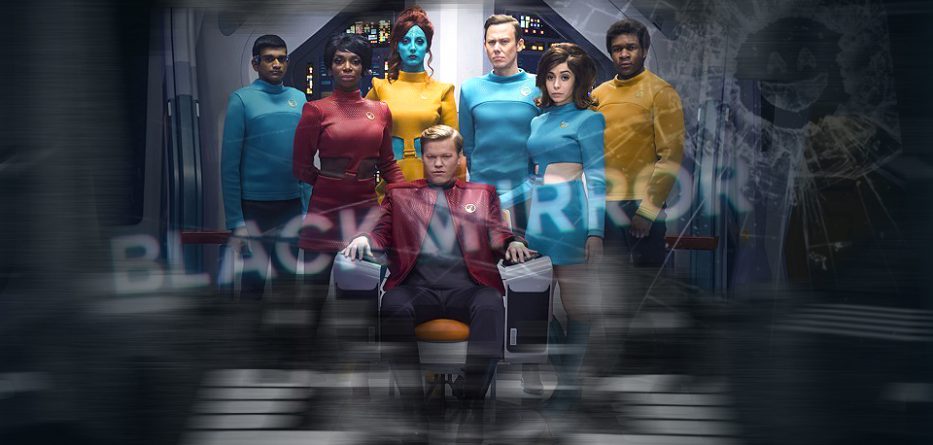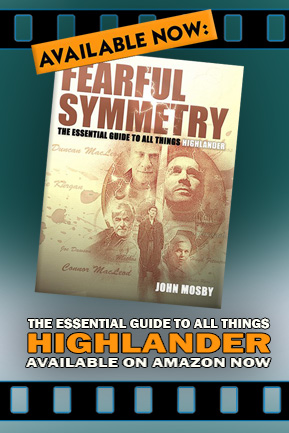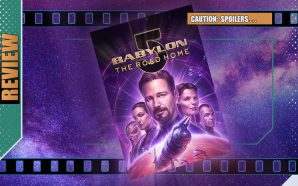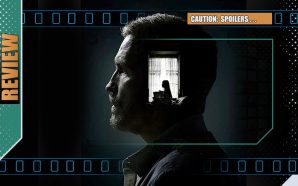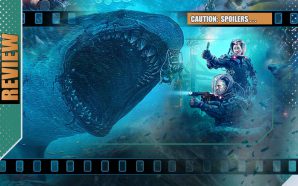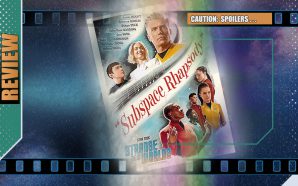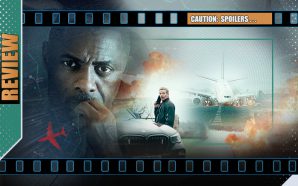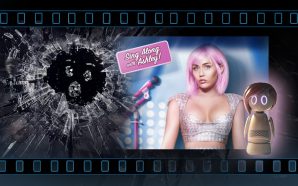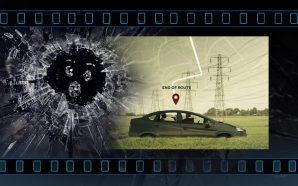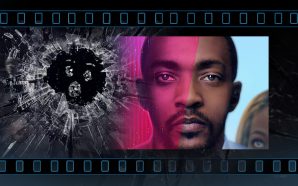Black Mirror has rapidly become one of the most acclaimed anthology series of recent times – at least by those whose tastes lean towards the subversive and fantastical. The brainchild of Charlie Brooker, the elastic nature of the ‘technology with consequences’ remit allows a broad canvas of otherwise connected entries that often feel like a Twilight Zone or Outer Limits descendant reimagined by everyone from Ken Loach to Hitchcock.
Though his formidable face and frame doesn’t appear at the start of each chapter , one can imagine Brooker emerging from the screen edges – warning you in less clipped terms that what you’re about to experience goes beyond the horizontal, the vertical and that, hey mate, you might want to order a beer, a pizza and a graveyard plot before you’re done. Oh, and keep an eye on that toaster, ‘cos it looks a bit evil, doesn’t it?
There’s a massive degree of talent but a serious lack of vanity in what Brooker has achieved here – the sheer breadth and length of scope may not always hit its precise mark, but it has an enviable hit rate. Credit is due not only to the often marvelous individual hours themselves but the way that each of those hugely different stories seems to fit into the over-all umbrella of the concept. It’s very much like giving a one-line instruction to different painters and seeing what disparate results they produce, ultimately giving them an exhibition for people to compare, contrast and enjoy.
While technology is the virtual (sometimes literally) link, the episodes are bonded by separate excellent performances and subtle music cues (surely a soundtrack album is a matter of time – but only available as a download) and Brooker – penning most of the stories himself – shows that he is able to switch creative levers and play to different audiences while never losing sight of both potential and bigger-picture with an aplomb that must make other showrunners envious. One wonders – and shivers with both nervousness and pleasure – at just what fresh angles and scares might happen if – a la Neil Gaiman – he was tempted to dip his toes in the waters of Doctor Who.
Viewers will have their favourites, but there really is something for everyone here. The series – now in its fourth run – remains a benchmark for its sheer bravery, fantastical creativity and the kind of televisual entry that has all the hallmarks of a timeless classic…
So – to the lastest batch…
USS CALLISTER.
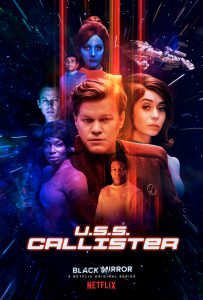 On the bridge of Space Fleet’s finest starship, Commander Robert Daly stands astride his flight deck and without ruffling a single hair on his head manages to save his team, shipmates and possibly the entire galaxy once more. His crew apparently adore him almost as much as he loves himself. For now, his battle is over, but there’ll be plenty more adventures to come…
On the bridge of Space Fleet’s finest starship, Commander Robert Daly stands astride his flight deck and without ruffling a single hair on his head manages to save his team, shipmates and possibly the entire galaxy once more. His crew apparently adore him almost as much as he loves himself. For now, his battle is over, but there’ll be plenty more adventures to come…
In the real world the co-founder of the Infinity gaming platform Robert Daly is victimised by his supposed partner and brow-beaten with indifference by his familiar staff. His day is brightened by the arrival of new team member Nanette Cole (Cristin Milioti) who seems to be the only person in awe of Daly’s coding talents, even as he races to beat an upgrade deadline for the company over Christmas.
Perhaps Nanette’s persona would be a great addition to his private Space Fleet server…
There’s a difficulty in explaining why the first entry in Black Mirror‘s latest run, USS Callister, is such an enjoyable hour of fun without giving away some of the sleight of hand that’s going on and some of the warped factors eventually on show. As often happens in Booker’s anthology series, an opportunity is given to lead you in one direction while preparing to transport you in another without warning. The episode might rely on your knowledge of Star Trek and it toys on both a visual and audio level with countless touchstones of the era, but given the show’s lasting cultural impact you don’t have to be a die-hard fan to appreciate the riff.
Jesse Plemons (Fargo) essays two very different versions of Daly giving us a ‘young Philip Seymour Hoffman’ quality which allows us to not just see his range but to allow the episode to work on a more organic / virtual level.
Fully embracing Trek, touching on Tron and giving face-time to a Twilight Zone classic this is a guilty pleasure of an hour that gently eases you in to the new run – being subversive and smart without some of the nihilistic edges that will inevitably get screen-time later. With great dialogue and memorable zingers this is essential viewing. Out-manouvering the sometimes underestimated The Orville series for cosmic homage and wit, it’s likely that somewhere Seth McFarlane is crying into his Earl Grey Hot.
ARKANGEL
 Marie (Alicia DeWitt’s ) nearly loses her child, Sara,at birth and then again when she’s an infant, off chasing cats in a local playground, so it’s understandable that she might look kindly upon the ‘Arkangel’ technology offered to keep tabs on Sara. In many ways it’s just a GPS implant with ‘extras’ for emergencies. Those add-ons include being able to see what Sara sees and being able to blur-out unsuitable images (such as a local dog that menaces her each time she goes past its fence).
Marie (Alicia DeWitt’s ) nearly loses her child, Sara,at birth and then again when she’s an infant, off chasing cats in a local playground, so it’s understandable that she might look kindly upon the ‘Arkangel’ technology offered to keep tabs on Sara. In many ways it’s just a GPS implant with ‘extras’ for emergencies. Those add-ons include being able to see what Sara sees and being able to blur-out unsuitable images (such as a local dog that menaces her each time she goes past its fence).
Marie assures herself that she’ll rarely use those extras, but as Sara gets older, Marie finds herself relying on them more often. However Sara herself is aware that the tech in her head is making her less aware of things other kids take for granted – for better or worse and as Sara approaches her adolescent years, will the choices she makes be for her own sense of discovery or her mother’s comfort?
Arkangel is less of a story, more a slice of drama – in the sense that anyone looking for a neat beginning-middle-end structure may be disappointed. But like many of the aspects Black Mirror addresses in one way or another it deals with good intentions clashing with basic human desires: in this case a parent’s desire to keep their child safe at all costs.
DeWitt’s Marie is not a bad mother – quite the opposite – and one who’s actions are driven by caring too much rather than too little. The decisions she makes are sometimes bad ones, but they are very human mistakes and there’s likely to be more than a few mothers watching the episode who will feel complete sympathy for the choices she makes.
But while many Black Mirror entries seek to surprise, it’s rather clear to see where this is going. There aren’t many shocks along the way, just the slow inevitable realisation that so closely monitoring someone and not allowing them to make mistakes can be as problematic as absolute disinterest. Jodie Foster’s direction is sedate and surburban – in a good way – and lets the story breathe organically. The result isn’t the most memorable entry of the new run, but still one that’s worth its place in the line-up.
CROCODILE
 On an isolated mountain road, two late-night partiers are making their way home when they hit a cyclist. Mia (Andrea Riseborough) wants to call the police but her boyfriend Rob (Andrew Gower) notes they are still over-the-limit. There are no witnesses and he decides they must dump the body and evidence in a local lake and simply pretend it never happened. Mia eventually agrees.
On an isolated mountain road, two late-night partiers are making their way home when they hit a cyclist. Mia (Andrea Riseborough) wants to call the police but her boyfriend Rob (Andrew Gower) notes they are still over-the-limit. There are no witnesses and he decides they must dump the body and evidence in a local lake and simply pretend it never happened. Mia eventually agrees.
Nine years later and Mia is a successful, married business-woman with a young son and feels worried when Rob wants to meet up during a convention she’s attending. In her hotel-room he tells her how he’s overcome his alcoholic tendencies and – as part of his recovery – is seeking to make amends with all those he’s wronged. That means he wants to contact the widow of the dead cyclist so that, even anonymously, they can give her some closure.Mia can’t dissuade him from his choice, so what choice does she have left to make sure she doesn’t lose everything?
Outside the hotel a minor traffic accident takes place, one that will prove you can’t insure against every eventuality…
A story as bleak as the Reykjavik backdrop that frames most of the story’s anonymous exterior locations, Crocodile is very much a story about the ripple effect and an ever-escalating series of consequences for one bad decision. It’s the kind of tale where any initial sympathies are slowly eroded by one bad action after another and it eventually becomes a case of wanting to see if any kind of real justice will be done.
Andrea Riseborough, a talented and versatile actress who has the intensity and quiet calm to have risen through a series of diverse, demanding roles while never being ‘showy’, balances both a cold and calculated aspect and growing panic to Mia as she plots her course to escape justice, each choice unraveling the situation yet more.
Kiran Sonia Sawar’s insurance agent, set up as Mia’s unknowing nemesis, is a good performance but after equal early initial screen-time it’s the kind of role where you want the stories to work better when they eventually collide. Instead it feels more like a levelling-up than a climax. The viewer’s opinion of the resolution to the story will largely depend on how much you’ve invested in the preceding hour – it’s one with a deal of irony, though a tone somewhat at odds with the ever-increasing, disturbing and nihilistic feel of what’s gone before… essentially a gallows punchline to a dark tale that shouldn’t have an ounce of humour.
HANG THE DJ
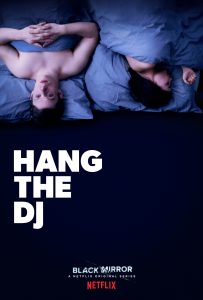 In a world where relationships are matched up by a computer system and given exact start and finish durations, Frank (Joe Cole) and Amy (Georgina Campbell) meet for the first time at a restaurant and find that they enjoy each other’s company more than they initially expect. Frank is clumsy but sincere, Amy is more out-going but caring but as they find they’ve only been allocated a 12hr ‘relationship’, it’s not enough time to work out if it would lead to anything more.
In a world where relationships are matched up by a computer system and given exact start and finish durations, Frank (Joe Cole) and Amy (Georgina Campbell) meet for the first time at a restaurant and find that they enjoy each other’s company more than they initially expect. Frank is clumsy but sincere, Amy is more out-going but caring but as they find they’ve only been allocated a 12hr ‘relationship’, it’s not enough time to work out if it would lead to anything more.
As they move through other relationships – with some aspects working better, some worse – they both find themselves missing that certain chemistry they had. When social interaction leads to them seeing each other again – albeit with other official partners – it’s clear there’s still something missing from both their lives.
But will the system allow them another chance on the way to ‘the one’ and even if it does, will human traits get in the way of true love?
While never reaching the heights of last season’s San Junipero, Hang the DJ is perhaps the most inherently optimistic entry in the new run of Black Mirror stories and the closest to a conventional love story told through unconventional means.
Cole and Campbell are likeable with enough charisma to float the whimsical if not essentially deep nature of this chapter. For much of its running-time it feels like a Richard Curtis film – a kind of Love, Virtually, if you must – as we see two people that we want to be together slowly realise they want to be together as well. The sting in the tale is whether the apparently dystopian society in which they exist will also judge that outcome accordingly. While other stories snarl, snap and show their teeth, Hang the DJ essentially smiles, winks and puckers up – any sense of real danger kept to the sidelines and as menacing as the stocky humourless bouncers who hover around without lines – but that doesn’t mean the result is disappointing.
Essentially Hang the DJ is a riff on dating technology and the often absurd claims of services that they can find your absolute ideal match with almost certain probability as long as they have enough information. Though it’s questioned more and more as they go along, the real story is really less about the environment Frank and Amy inhabit and more about their innate sense and need to break away from the structure and obstacles that are put in their way. Even the most cynical viewer will want them to end up together, but will Black Mirror give them a break?
METALHEAD
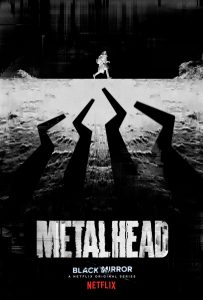 A van approaches an apparently deserted factory. Three weary travellers are looking are on a mission of mercy and looking for a specific box is the heart of the decrepit building. Unfortunately, the premises are still guarded and they disturb one of the robotic sentinels that still remain.
A van approaches an apparently deserted factory. Three weary travellers are looking are on a mission of mercy and looking for a specific box is the heart of the decrepit building. Unfortunately, the premises are still guarded and they disturb one of the robotic sentinels that still remain.
Forced to flee, Bella (Maxine Peake) is the only survivor of the initial encounter. But she is injured and desperate and is now being pursued by the dog-like robot that will never, ever stop following unless it is destroyed. Will human frailty but ingenuity be able to outwit a singularly lethal programming and sharp arsenal?
Perhaps the most outright ‘horror’ story of the new run, Metalhead benefits from its monochrome filming, the mixture of urban and rural wilderness given an extra edge by the lack of colour.
Inspired by the Boston Dynamics videos of robotic ‘dogs’ able to ‘run’ and reassert themselves when encountering obstacles, Brooker’s story essentially asks how much an adversary such a creation would be if further enhanced and given lethal abilities.
Quite how the world got to the state we see in Metalhead is never explained with the tale quite wisely hunkering down to dealing with the more immediate problem. Like a technological version of The Walking Dead dilemma, you really don’t need to know what started a zombie plague, you just need to survive it. Maxine Peake is a wonderful actor (and Black Mirror has a strong track record in making the most of strong leading ladies) and she gives us a Bella who is one part Rick Grimes, one part Ripley, one part a mother from an Alan Bleasdale kitchen-sinker.
The story is a simple cat (or more accurately dog)-and-mouse game of pursuit and pursued as the beast of the title follows its simple programming to protect its property and hunt down anything that threatens it. With basic programming it has a relentless remit akin to a Dalmation-sized Terminator and though it’s resources are limited they have a lethal edge and dexterity that can’t be downplayed.
Directed by David Slade (American Gods, Hard Candy), Metalhead could easily be turned into a longer and more ‘Hollywood’ feature, but this entry – drawing on a legacy of the genre without ever feeling merely derivative – gives us a minimalist approach that works better devoid of any further bells and whistles.
BLACK MUSEUM
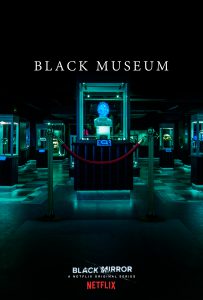 Pulling up to an isolated gas/power station, Nish (Letitia Wright) needs time for her car to recharge under its solar-power system and so walks over to the next building labelled as the ‘Black Museum’. Though not officially open until later in the day, its owner Rolo Haynes (Douglas Hodge) says he’ll let her in, happy to show offer his collection of horror memorabilia and weird technological curiosities.
Pulling up to an isolated gas/power station, Nish (Letitia Wright) needs time for her car to recharge under its solar-power system and so walks over to the next building labelled as the ‘Black Museum’. Though not officially open until later in the day, its owner Rolo Haynes (Douglas Hodge) says he’ll let her in, happy to show offer his collection of horror memorabilia and weird technological curiosities.
As they walk around, Haynes tells her the history behind some of the objects – each carrying with them a tale of loss, danger and horror to those that once possessed them and how they each led him to this place and time…
Black Museum is very much an anthology episode within an anthology show and, if you observe carefully, a few call-backs to previous Black Mirror stories with named elements and locations. It’s reminiscent of those horror films in which an unreliable narrator tells scary tales that have some tenuous connection, ready for a big scare at the end. From the very start we really don’t trust Douglas Hodge’s curator – a seedy sideshow opportunist whom we discover is scraping a living after his senior position in an experimental wing of a hospital led to various unfortunate outcomes for certain patients. While his grim (grimm?) tales of escalating atrocities and questionable tech hold a morbid curiosity – each of them suitable for their own entry if they were expanded – the question is to where Nish (and we as an audience) are being led. The scenery is murky, but what of the destination?
Bearing the moniker of a character that feels straight out of a Stephen King tome, Rolo Haynes spins many tales, the first about a doctor addicted to a device that helps him experience patients’ symptoms without the actual degrading effects (actually inspired by an idea from magician Penn Jilette) and and goes down an effective grand guignol route of slice and dice horror. The second – a tale of marital strife, consciousness and teddy bears – is a very different kind of drama though one can imagine the horror involved. The third is the most inhuman, dealing with Haynes choice to turn a death-row inmate’s final moments into an eternal interactive attraction.
By the time we get to the end of the tragic trilogy of terror the only question is whether Nish will be a final victim or victor. The ending is well constructed enough to be satisfying and troubling in equal measure.

